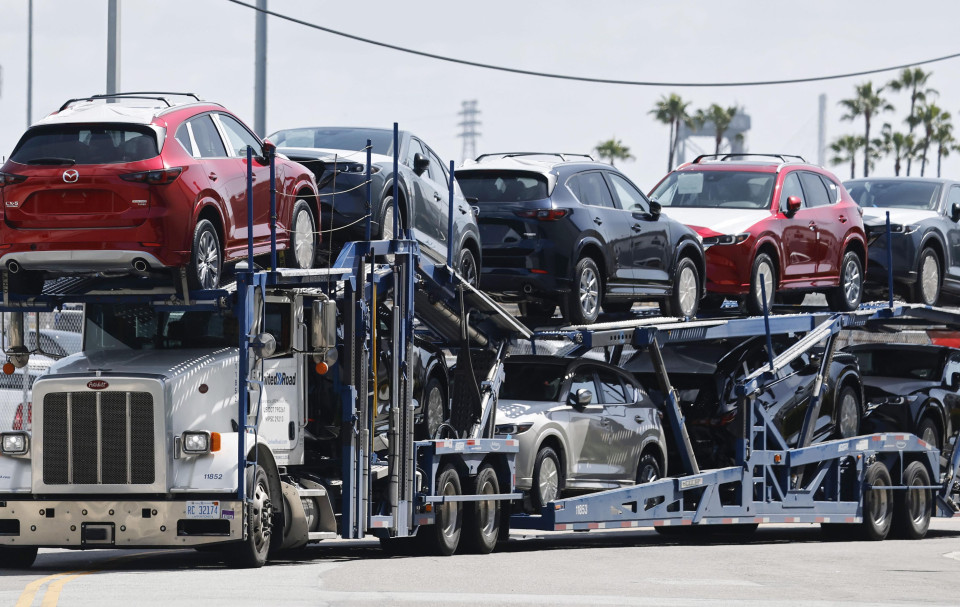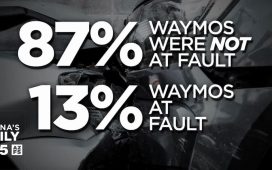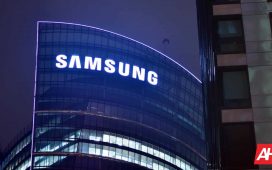U.S. President Donald Trump on Tuesday eased the impact of his new 25 percent tariffs on the auto industry as part of efforts to help manufacturers relocate supply chains for car parts used in the United States over the next two years.
In another reversal of Trump’s extensive additional tariffs, the relief, allowing all American and foreign automakers producing vehicles in the United States to claim some reimbursements, was announced as he marked the 100th day of his nonconsecutive second term.
“They took in parts from all over the world. I don’t want that. I want them to make their parts here, but I gave them a little bit of time,” Trump said in a speech to thousands of supporters at a community college north of Detroit, home to the American auto industry.

New Mazda cars are transported from an automobile processing terminal at the Port of Los Angeles on April 3, 2025, in Wilmington, California. (Getty/Kyodo)
The temporary alleviation of some of the tariff burden came after automakers argued that due to the complexity of their supply chains it would take time to procure domestically all of the parts necessary to manufacture vehicles in the United States.
Along with consumers, the auto industry has voiced concern that Trump’s hefty tariffs could sharply raise car prices.
Under the relief, a manufacturer will be allowed to offset 15 percent of the suggested retail price of an automobile assembled in the United States during the first year of the tariffs and 10 percent in the second year.
Accordingly, automakers will be able to apply for a reimbursement of up to 3.75 percent of the value of each U.S.-made vehicle in the first year and 2.5 percent in the second year, with the offset arrangement stopping then, according to White House and Commerce Department officials.
Under the scheme, the officials said, automakers will only pay one tariff — the highest rate that applies to their goods — without being hit by any of the Trump administration’s other new duties, such as a 25 percent tariff on imported steel and aluminum.
In early April, an additional 25 percent tariff on all automobiles made outside the United States took effect, which raised the tax rate on imported passenger vehicles to 27.5 percent, dealing a blow to Japanese, German, South Korean and other foreign carmakers as well as their American rivals.
The relief came four days before a 25 percent tariff covering engines, transmissions and other key auto parts was due to go into effect.
Although the auto tariffs will remain in place, major automakers including Ford Co. and General Motors Co. welcomed the measures to cushion the effects.
In a related development, Treasury Secretary Scott Bessent suggested Tuesday that the United States is poised to reach a tariff deal with India in the not-so-distant future, marking the first such agreement since Trump returned to office in January.
Bessent said major U.S. trading partners and allies in Asia, including Japan and South Korea, have been the “most forthcoming” in terms of aiming for deals with the Trump administration since its imposition of broad-based tariffs on imported goods.
On India, Bessent said a deal is “very close” and the country is easier to negotiate with than many others because its high tariffs are the main point at issue.
Negotiations with some other countries involve nontariff trade barriers that can be “much more insidious and also harder to detect,” he said during a press briefing with White House spokeswoman Karoline Leavitt.
Bessent said the United States has 18 important trading relationships and the Trump administration will hold talks with at least 17 such partners over the next few weeks.
Japan’s chief negotiator in its tariff talks with the United States, Ryosei Akazawa, is set to arrive in Washington on Wednesday. He is expected to hold talks with Bessent, with the auto and agricultural sectors likely to top the agenda.
Related coverage:
40% of Japan prefectures offer financial aid over U.S. tariffs: poll
Japan mulls simplified checks for more car imports in talks with U.S.
Japan main opposition party aims to cut tax on food as election looms







